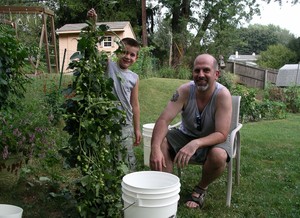DIY: Beer!
When I was underage and in college (and with a very weak fake), my roommates and I looked into homemade beer kits for a cheap and reliable source of beer. Ultimately, we figured the stench of yeast might tip-off the dorm supervisor.

In writing this post, I trust I’m encouraging the craft of beermaking, not law aversion. Let’s respect beer.
Instructables gives us the step-by-step instructions, with photos. Most home brews combine four basic ingredients: malt, hops, yeast, and water. For video instructions, check out ExpertVillage. I suggest the how-to guide for my favorite brew – the Indian Pale Ale.
If this is just all too confusing, you could just buy Mr. Beer. It’s on sale!
For whatever process you choose, you can purchase an ingredients kit for your desired variety, but how DIY is that? This Pennsylvanian grew his own hops:
LAST SEASON’S disastrous hops shortage has sparked a run on rhizomes, the planted stems that grow into towering, hop-bearing bines.
Homebrewers and, remarkably, some small breweries are buying up hop rhizomes in a new wave of do-it-yourself farming of one the key ingredients of beer. The plants are becoming so scarce this spring that some would-be growers have resorted to buying them on eBay at marked-up prices.
"There’s definitely a panic out there, because brewers can’t buy the hops they need," said Dave Wills, an Oregon hops supplier who said his rhizome sales increased 400 percent this year.
"Brewers don’t want to be at the whim of big [hops] dealers," Wills said. "So now some of them are looking into growing their own."
In central Pennsylvania, for example, brewers Ryan Richards and Jesse Rotz have spent the past weeks planting 200 hop rhizomes on a family farm near Gettysburg.
"I’m not expecting very many hops in the first year," said Richards, who expects to open Roy Pitz Brewing in Chambersburg in June. "But hopefully after the second year, we’ll have significant yield that we can use for our own beer, plus trade and sell online."

The green, conelike hop flowers are the spice of beer, providing bitterness, flavor and aroma. Their production is controlled mainly by agricultural cartels in several distinct regions around the world, including Germany, the Czech Republic, China and the northwestern United States.
Most of the new generation of hops growers are homebrewers, hobbyists with a bit of backyard space for the sprouts.
And if you want to be super fresh and natural, make a certified organic brew:
As a home brewer you have many choices. Why not choose to brew organic! Your choice will give you clean tasting, fresh organic beer, and your choice will have a positive impact by supporting chemical and GMO* free sustainable agriculture. Organic homebrew might cost slightly more, but it is significantly less expensive than buying organic beer at a store. Plus, the cost is an investment in a better world!